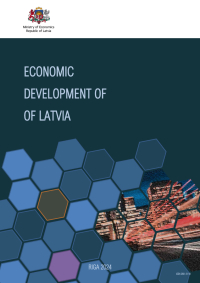After the rapid recovery of the economy from the crisis of the COVID-19 pandemic in 2021, growth in Latvia slowed to 3.4% in 2022. The economic development in 2022 was significantly influenced by the disruptions in supply chains caused by Russia’s invasion of Ukraine, the rise in inflation caused by the cost of energy and food, as well as the decline in global demand. In the first half of 2022, the consequences of the war were not yet felt in full in Latvia. The economy grew 5.8% compared to the first half of 2021. The rise was affected by the low base in early 2021 and the gradual lifting of COVID-19 restrictions. However, in the second half of the year, growth decreased to 1.2%, as the export-import balance deteriorated and the growth rates of private consumption and investments decreased.
In 2023, economic development continued to be affected by the geopolitical situation and uncertainty, high prices and growing bank interest rates. Compared to the corresponding quarter of the previous year, economic growth stopped in Q1, GDP already decreased by 1.1% in Q2 and 0.7% in Q3. In Q1-Q3 of this year, GDP was 0.6% lower than in the same period a year before. Overall, in 2023, GDP is expected to remain close to the levels of 2022.
In 2024, the economy will begin to grow slightly faster. International institutions predict that in 2024 the economy in Latvia’s largest export markets will grow and will have a positive impact on the country’s export opportunities. As real wages resume to grow, private consumption is also expected to resume growth. The implementation of EU fund programmes will have a positive impact on investment dynamics. The Ministry of Economics (MoE) predicts that GDP growth could reach 2.1% in 2024.
Further economic development in the medium term depends on the situation in the external environment and progress in reforms. The highest risk to the growth of Latvia is related to global economic development, particularly the geopolitical situation. Further development of the EU’s total economic space is similarly important. In the medium term, the economic advantages of Latvia are mainly based on the achieved macroeconomic stability, as a result of which Latvia’s credit ratings have improved, as well as on the efficiency of planned aid programmes of the EU funds and the improvements in the business environment. If the war in Ukraine endures, the pace of economic recovery might be slower.
If the advantages of Latvian economic competitiveness are mainly based on technological factors, improvement of production efficiency, and innovation, and to a lesser extent on cheap labour and low resource prices, Latvia’s growth rates could potentially reach 4-5% per year in the medium term.
Previous reviews and other publications on economic development can be found here ...



